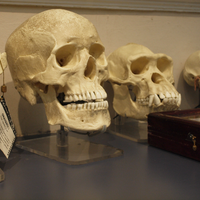
An estimated 3 million people recently watched Ken Ham, the dour Australian expatriate and evangelical entrepreneur who runs the creationist ministry Answers in Genesis in northern Kentucky, try to argue the scientific viability of his form of creationism against Bill Nye, the beloved “Science Guy” of children’s television fame. While it’s unlikely the live-streamed event changed many minds, it was arguably the most prominent debate concerning creationism and evolution to date.
Among the most probable outcomes of this event is widespread renewed interest in debating evolution. Scientists may increasingly find themselves challenged to debate creationist evangelists, and perhaps threatened to be added to a “debate dodger” list should they hesitate. Worse yet, either because they admired Nye’s performance and wish to emulate it, or because they fault his performance and wish to surpass it, scientists may be tempted to challenge creationists to debate.
Scientists should decline...
- Such debates confer unearned legitimacy on the creationist position. When a scientist debates a creationist about evolution, he or she is conveying the message that the creationist has a scientific case to make, even though creationists explicitly or implicitly prioritize scripture over science. Revealingly, creationists do not argue—nor even attempt to argue—for their views how scientists argue for their scientific positions.
- Such debates tend to mislead the audience about the nature of scientific practice. Scientists argue with each other, sometimes fiercely, but they do not argue in the service of a religious ideology. Rather, they argue in the service of a common goal: ascertaining how the natural world works. And they do so in venues that reward the objective assessment of evidence rather than oratorical prowess, such as research publications and professional conferences.
- Most debate formats allow the creationist participant to engage in the Gish gallop, so named for the late stalwart creationist debater Duane T. Gish, who was notorious for his breakneck recital of half-truths, out-of-context quotations, and quibbles, presented in such swift succession that the opposing scientist was oftens unable to track, let alone refute, every point. As a result, the audience is left with the misapprehension that the points left unrefuted by the scientific debater are valid.
- Such debates are often presented, explicitly or implicitly, as debates over religion, with the creationist happily assuming the role of defender of faith, God, and the Bible, and the scientist cast, willingly or unwillingly, in the opposite role. Because evolution is accepted on the basis of the overwhelming evidence by scientists of all faiths and of none, it is inaccurate and unhelpful for it to be presented as distinctively and inextricably connected with any position on religion.
- Such debates help to stimulate the base and swell the coffers of their creationist sponsors. What’s worse, they fuel local enthusiasm for creationism, contributing to pressure on local teachers to teach creationism or downplay evolution. A survey conducted in 2007 revealed the dismal fact that one in eight public high-school biology teachers in the United States already present creationism as scientifically credible, and that six in 10 already downplay evolution.
Still, Nye’s performance may not have hurt science. He researched his opponent’s views, consulted with experts, and prepared thoroughly, as would any careful debater. But he enjoyed a crucial advantage that the average scientist is unlikely to share. Nye is a brilliant and admired science communicator, with a professional entertainer’s stage presence and the ability to connect with a general audience. Debates are performances, and Nye is a splendid performer.
We applaud scientists who are concerned about the precarious state of evolution education in the United States and want to confront creationism. But participating in formal oral debates with creationists is far from the best—and certainly not the only—way to do so. By all means, confront creationism, but do so in ways that advance, rather than hinder, the goal of a scientifically literate public that supports the teaching of evolution.
Ann Reid is the executive director of the National Center for Science Education, a not-for-profit organization that defends the teaching of evolution and climate science, where Glenn Branch is deputy director.
Interested in reading more?




